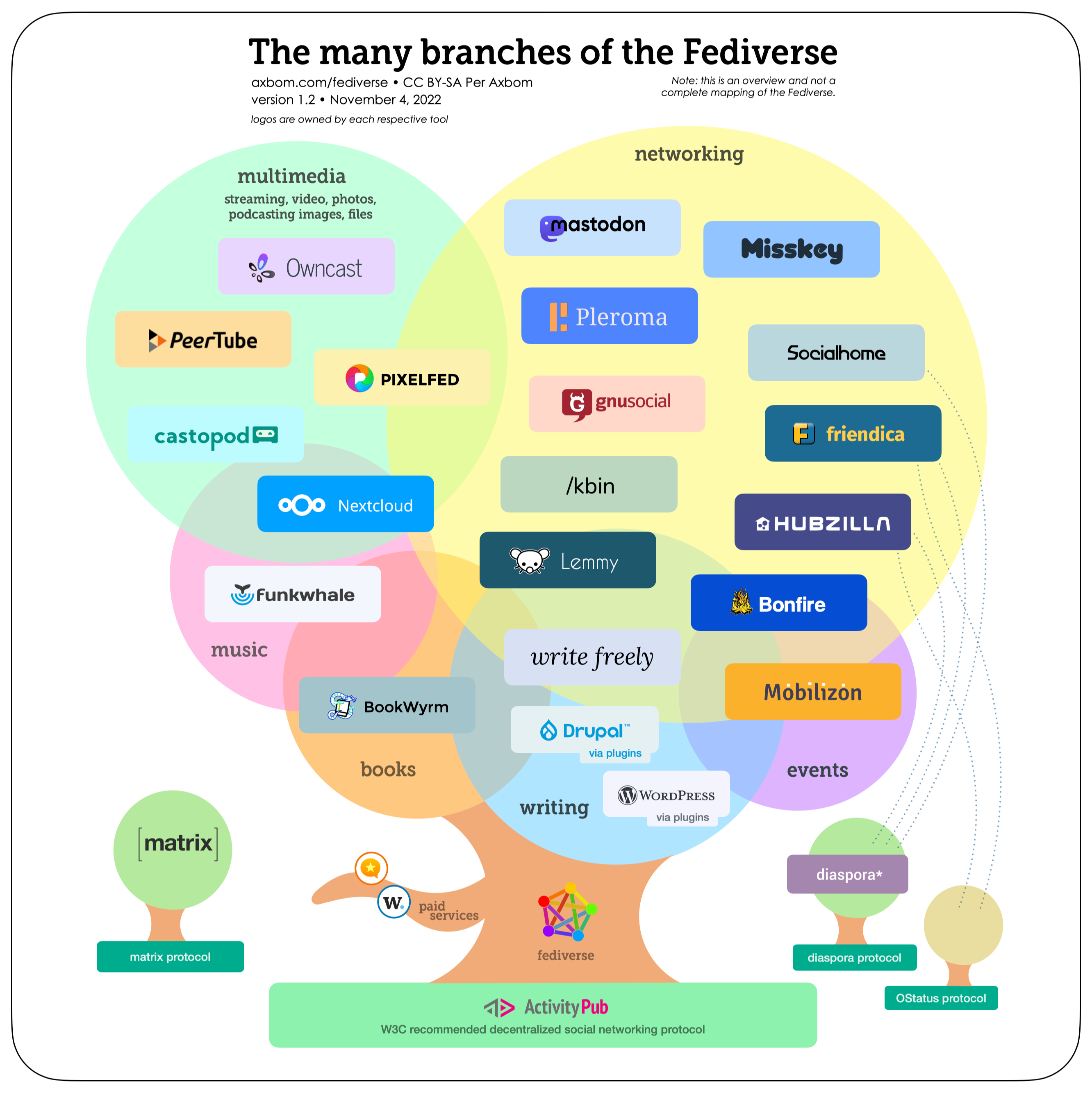

What absolute bull. 🤦


What absolute bull. 🤦


fixed again. jeebus.


Updated with a new link from EBU.


I think throwing around vague but scary-sounding terms like “compromised” is a very bad idea.


I can certainly tell you that Lemmy wont blindly follow what Mastodon is doing.
Good to hear.
They arent doing a good job for the Fediverse, for example they make zero effort to improve compatibility with other projects. Instead others are left to reverse engineer their federation logic.
Yeah. Plus, the sheer size of mastodon.social and the monoculture of Mastodon-based instances is just unhealthy. I wrote about it at length.


Wonderful!


This Tech Won’t Save Us podcast episode makes a very important point: any movement that does not have a structure and some form of leadership can easily be taken over by anyone willing and able to fill that kind of power vacuum.
Fediverse currently does not have a structure nor a form of leadership other than perhaps “whatever Mastodon is doing”. That’s problematic. I hope that we recognize this and do something to fix it, before that power vacuum gets filled by… someone we might not like.
I do see that the researchers involved in the OP link are Erin Kissane and Darius Kazemi. That’s fantastic. They are truly fedi old guard, deeply engaged, very knowledgeable, and generally wonderful human beings.
Fair point, edited.
I am still hoping beyond hope they do revive it, there seems to be others that do as well.
Will we get tabbed/grouped windows finally again? Been waiting for this for half more than a decade.


Actually, if we’re nit-picking, it means “Personal Computer”, but the colloquial meaning has shifted somewhat since the good old IBM times to first mean desktop computers (as opposed to laptops), and then to mean non-Apple computers (including laptops), which for most people means “a computer that runs Windows.”
Which is the basis of my heavy sigh.
These are just two different software projects that a Threadiverse instance can use. They federate with one another, so it doesn’t matter all that much if you have an account on a Kbin instance, or a Lemmy instance. The differences are in the interface, some functionality, and the tech stack used (Lemmy is written in Rust; Kbin in PHP).
There are 100+ instances of Lemmy, and ~10 instances of Kbin. Kbin is a much younger project (hence it might get missed), and it’s main instance, kbin.social seems to be experiencing more issues with the wave of new registrations. If you want to try Kbin, https://fedia.io/ might be a good instance to check out.


I don’t think you need to worry about it. It’s up to a given community whether or not that baggage affects it or not, I think. Building communities that are very explicitly not tankie is a great way of helping overcome that baggage for the whole project.


Ok, I should have been more specific: the way it is often framed (and the way I have seen it framed, and how the linked article frames it) is as if these were US-affiliated labs working on bioweapons. That is not what Nuland said. Biological research facilities do not have to be bioweapons labs, just as explosives research facilities need not be arms manufacturers.
Greenwald (the author of the linked article) of course does what Greenwald recently is hell-bent on doing, which is to try to scandalize anything he can. I used to respect the man, but that was a long while ago.


This will help:

The source is well-worth visiting and taking the time to read, plenty of additional info!
Well duh. “PC” means “Windows”, obviously.
sigh


I don’t think this phrase means what you think it means; I do in fact put my money where my mouth is.
My mouth is clearly in the “blockchain-based privacy projects are very likely to be either misguided or outright scams, and this particular project has red flags all over” area. And so my money is on “I need to use tools that actually work; there is low likelihood that this project is such a tool; therefore I shall not waste my time on it”.
Demanding that I spent hours analyzing a project that has so many red flags just because you happen do disagree with me is somewhat weird. I’ve spent enough time having this conversation at all, but hey, that’s good entertainment value!
It’s not on me to disprove random project’s exorbitant claims (“prevents traffic analysis by an adversary capable of watching the entire network, including the NSA”). It’s on the project in question to prove them.
So far I have not seen such proof. I have, on the other hand, seen quite a lot of things that suggest that these claims might, in fact, be unsubstantiated.
I could retort by saying: prove to me that the project’s claims are true, “instead of going hurr durr it’s great I love it” (nice veiled ad hominem there, by the way). But I won’t, even though so far I have arguably provided more concrete reasons why I see this project as problematic than you did for your positive take on it.
Telling persons why they’ve decided to use tokens and not rely on pure altruism is not token hyping.
When the rubber hits the road, “using tokens” in this case means simply relying on greed. And relying on greed instead of altruism for something as fundamental as privacy is very telling. It’s not going to end well.


All the claims against tor and i2p are discussed in numerous academic papers and are acknowledged by the developers themselves
I was not talking about claims about i2p or Tor. I was talking about the claims Nym people make about their own project. I see little reason to trust them on those claims.
You’re entitled to your opinion. I am entitled to mine. I don’t think we will see eye to eye here. In 10 years we will perhaps know; I expect Tor to still be around and useful then, as opposed to Nym.


Sure, here’s my comment:
They make extremely strong claims, and strong claims require strong proof. I do not see such proof anywhere. What I see is that they play fast and loose with website visitor privacy and seem to focus mainly on token hyping.
I would not trust it for anything even remotely sensitive. And I still fully expect them to show up on https://web3isgoinggreat.com/ sooner or later.
HAproxy cannot serve static files directly. You need a webserver behind it for that.
Apache is slow.
Nginx is both a capable, fast reverse-proxy, and a capable, fast webserver. It can do everything HAproxy does, and what Apache does, and more.
I am not saying it is absolutely best for every use-case, but this flexibility is a large part of why I use it in my infra (nad have been using it for a decade).